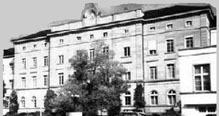Sigmund Freud And... |
Carl Gustav Jung
Of Swiss origin, Jung was the son of a pastor. He made medical studies, became specialised in psychiatry, then entered Burgholzli, the famous Zurich Psychiatric Hospital, whose manager was the no less famous Eugen Bleuler.
Between 1902-1903, Jung attended a training course in Paris, with Pierre Janet, then returned to Zurich to be appointed chief physician in Burgholzli It is in this context that Jung became introduced to Freud, in
1907. Freud was attracted by Jung's prestige and personality and was soon to see him as his spiritual son, who could ensure the survival of psychoanalysis.  Carl Gustav Jung (1875-1961) was considerably
important in the analytical movement for his being generally regarded as the dissident prototype, for the impact of his break as well as for the extent of the movement he created thereafter.
Carl Gustav Jung (1875-1961) was considerably
important in the analytical movement for his being generally regarded as the dissident prototype, for the impact of his break as well as for the extent of the movement he created thereafter.
Burgholzli, the famous Zurich Psychiatric Hospital |
Jung was the subject of an impetuous rise in the hierarchy of psychoanalysis. He became the editor of the Jahrbuch, in 1908, took part in the 1909 voyage to America, and became the first president of the International Psychoanalytic Association, in 1910.
In his desire to find a quality promoter of his ideas in Jung, Freud tended to minimize Jung's ambivalent manifestations and reserves. The latter had to do with the role of sexuality in the psychic development. Jung had in fact never truly acquiesced to Freud's sexual theory, which he judged as too extensive.
Starting with 1912, Jung took more and more distance in his writings, which cause a clamorous rupture to be made concrete in 1914, by Jung's resignation from his positions.
|
After a short period of personal disorders, Jung founded his own school (called the analitical psychology), and produced a
considerable work which appealed to many disciples. Forsaking the meanders of psychosexuality, Jung embraced spirituality and the so-called rational theology.
Read laso:
-
Jung Meets Freud - paper on the historical collaboration
between Freud and Jung.
- Online resources for the study of Carl Jung's theories and methods: https://www.carl-jung.net.
--
Copyright René DesGroseillers.
|
|
Home | Resources | Forum | Newsletter | Contact Copyright 1999-2024, AROPA. All rights reserved.
![]()
